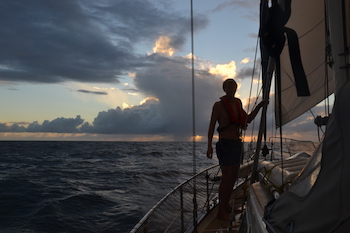
(show on map)
12:15UTC+2

13.08.201911:45UTC+2
Watches on passage
 Before we started cruising, it was hard to imagine how two adults and two children could control the ship 24/7. Above all, I had concerns about lack of sleep. After several long passages including the 19-day Atlantic crossing and the 36-day crossing of the East Pacific with our family crew, we figure that permanent watches are feasible without establishing a large sleep deficit. Repeatedly, we considered taking additional crew before the longer passages as many blue-water sailors are doing. We always decided against it, mainly because of limited privacy and the uncertainty whether the unknown crew would merge in.
Before we started cruising, it was hard to imagine how two adults and two children could control the ship 24/7. Above all, I had concerns about lack of sleep. After several long passages including the 19-day Atlantic crossing and the 36-day crossing of the East Pacific with our family crew, we figure that permanent watches are feasible without establishing a large sleep deficit. Repeatedly, we considered taking additional crew before the longer passages as many blue-water sailors are doing. We always decided against it, mainly because of limited privacy and the uncertainty whether the unknown crew would merge in.
Watch schedule
As we are a crew of two adults only, Christian and myself need to share watches 24|7. During the day we have no fixed schedule for watches, but mostly Christian is on watch, where I play with the kids, bake, cook and perform other house hold duties. After having an early dinner, the children go to bed usually between 7 and 8 pm. Christians first watch begins, while I sleep until 11 pm. From 11 pm until 2 am I am on watch and again at dawn, starting around 6 am. The children usually share my last watch. Between 8 and 9 am we are having breakfast as a family.
Watch conduct
During our watches usually the wind vane is steering the boat, in exceptional cases when winds are very light and the vane is not working properly or in case we are running under engine, the electrical autopilot is at the helm.
Off shore, every 15 minutes, we first (as eyes were adjusted to the dark) conduct a thorough watch out for navigational lights and dark clouds, subsequently we check course, wind direction and AIS signals. In areas with traffic, in coastal waters or in rough conditions, frequency for watch outs are increased. If required we also switch on the radar (e.g. for checking for approaching squalls) or turn on the electronic compass, sonar or wind meter. Constantly, we run GPS, AIS and navigation lights during the night to save energy.
While we stay most of the watch time in the deck saloon, we go outside for the look around. Between the single watch outs we spend time radioing, reading, cleaning or simply relaxing and always run a timer reminding us for the next watch out, which is great for the peace of our minds.
In case we need to adjust sails during the night, we do adjustments if feasible at the end/beginning of the watch. In case sails need to be reefed when winds increase both of us are required on deck. This luckily does not happen too often. We generally wear life jackets and life lines when working outside at night.
If no additional working hours occur during the night our watch schedule offers sufficient resting time, that both of us are fit for the next day without additional naps. Sometimes especially at the beginning of passages, when I do not have my sea legs yet, I take an additional nap during the day. Christian luckily is more robust and less prone to sea sickness.